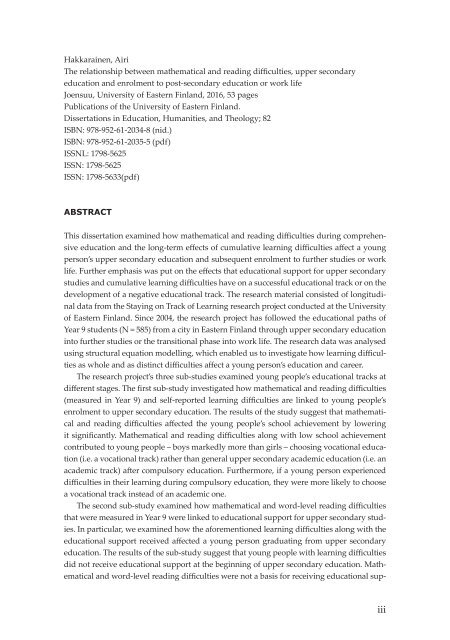urn_isbn_978-952-61-2035-5
urn_isbn_978-952-61-2035-5
urn_isbn_978-952-61-2035-5
Create successful ePaper yourself
Turn your PDF publications into a flip-book with our unique Google optimized e-Paper software.
Hakkarainen, Airi<br />
The relationship between mathematical and reading difficulties, upper secondary<br />
education and enrolment to post-secondary education or work life<br />
Joensuu, University of Eastern Finland, 2016, 53 pages<br />
Publications of the University of Eastern Finland.<br />
Dissertations in Education, Humanities, and Theology; 82<br />
ISBN: <strong>978</strong>-<strong>952</strong>-<strong>61</strong>-2034-8 (nid.)<br />
ISBN: <strong>978</strong>-<strong>952</strong>-<strong>61</strong>-<strong>2035</strong>-5 (pdf)<br />
ISSNL: 1798-5625<br />
ISSN: 1798-5625<br />
ISSN: 1798-5633(pdf)<br />
Abstract<br />
This dissertation examined how mathematical and reading difficulties during comprehensive<br />
education and the long-term effects of cumulative learning difficulties affect a young<br />
person’s upper secondary education and subsequent enrolment to further studies or work<br />
life. Further emphasis was put on the effects that educational support for upper secondary<br />
studies and cumulative learning difficulties have on a successful educational track or on the<br />
development of a negative educational track. The research material consisted of longitudinal<br />
data from the Staying on Track of Learning research project conducted at the University<br />
of Eastern Finland. Since 2004, the research project has followed the educational paths of<br />
Year 9 students (N = 585) from a city in Eastern Finland through upper secondary education<br />
into further studies or the transitional phase into work life. The research data was analysed<br />
using structural equation modelling, which enabled us to investigate how learning difficulties<br />
as whole and as distinct difficulties affect a young person’s education and career.<br />
The research project’s three sub-studies examined young people’s educational tracks at<br />
different stages. The first sub-study investigated how mathematical and reading difficulties<br />
(measured in Year 9) and self-reported learning difficulties are linked to young people’s<br />
enrolment to upper secondary education. The results of the study suggest that mathematical<br />
and reading difficulties affected the young people’s school achievement by lowering<br />
it significantly. Mathematical and reading difficulties along with low school achievement<br />
contributed to young people – boys markedly more than girls – choosing vocational education<br />
(i.e. a vocational track) rather than general upper secondary academic education (i.e. an<br />
academic track) after compulsory education. Furthermore, if a young person experienced<br />
difficulties in their learning during compulsory education, they were more likely to choose<br />
a vocational track instead of an academic one.<br />
The second sub-study examined how mathematical and word-level reading difficulties<br />
that were measured in Year 9 were linked to educational support for upper secondary studies.<br />
In particular, we examined how the aforementioned learning difficulties along with the<br />
educational support received affected a young person graduating from upper secondary<br />
education. The results of the sub-study suggest that young people with learning difficulties<br />
did not receive educational support at the beginning of upper secondary education. Mathematical<br />
and word-level reading difficulties were not a basis for receiving educational sup-<br />
iii



